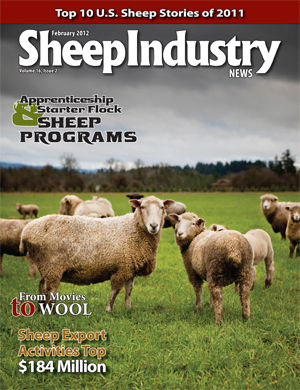
- February 2012
- Top 10 U.S. Sheep Stories of 2011
- Feds Drop Great Lakes Wolf Delisting
- California Apprenticeship Building Future Producers
- Predation Leading Cause of Grouse Mortality
- U.S. Sheep Export Activities Top $184 Million in 2010
- ND Starter Flock Program Starts Youth in Path to Sheep
- From Movies to Wool: Farm Enjoys Success in Fiber Milling
Top 10 U.S. Sheep Stories of 2011
(February 1, 2012) From record prices to drought and wild sheep to wolves, there was no room for the minor story when recapping the events of the sheep industry in 2011. The American Sheep Industry Association (ASI) selected the following top 10 sheep stories as a recap of 2011.
Let’s Grow Campaign Rolled Out – Producers from across the United States are participating in the Let’s Grow with twoPLUS initiative to strengthen the lamb and wool industry’s infrastructure for the long-term sustainability of the industry by increasing the number of sheep in production. With three goals in mind, the primary objective of this campaign is to encourage current producers to expand their sheep numbers by 2014. This initiative will result in 315,000 more lambs and 2 million more pounds of wool for the industry to market. To get the word out, media events were held in Iowa, Minnesota, Ohio, Indiana, Tennessee and California. The www.growourflock.org website contains the program details.
Federal Spending Package Includes Wild Sheep Language – The omnibus spending package included ASI-supported language regarding sheep grazing and wild sheep. The language prohibits the U.S. Forest Service from using funds to reduce domestic sheep grazing because of conflicts with bighorn sheep, unless the management is consistent with a state wildlife plan. This inclusion gives the industry and researchers the necessary time to finalize the implementation of promising vaccines to address disease issues, as well as strategies to implement best management practices to promote the coexistence of both species of sheep.
Industry Defeats Anti-Wildlife Services’ Amendment – An animal-rights led amendment by the Humane Society of the United States and Natural Resources Defense Council to cut funding to the U.S. Department of Agriculture’s (USDA) Animal and Plant Health Inspection Service’s Wildlife Services (WS) Agency by $11 million was soundly rejected by the U.S. House of Representatives. Fully two-thirds of the House rejected an amendment to reduce funding for WS.
Generation-Setting Wool, Lamb and Pelt Markets – Wool and lamb prices hit all-time highs this year and sheep producers agree that this is a great time to be in the sheep business. A high demand for both products resulted in rising prices.
Superwash Line Begins Production – The superwash equipment that was reintroduced into the United States by the Sheep Venture Co., in association with ASI, began production this year. Machine usage has exceeded industry projections and, according to wool warehousemen, more than $1.5 million in premium prices were paid to producers this year due to the superwash equipment. Additional commercial textile firms in the United States have entered the market because they could buy domestic wool and have the entire process done in America, thereby creating more competition.
Wal-Mart and Kroger’s Announce American Lamb Programs – Two major announcements to carry American lamb in our nation’s grocery stores occurred: Kroger, one of the nation’s largest grocery store chains, launched an American lamb branded campaign and Super Wal-Mart announced that all 40 distribution centers would exclusively carry domestic lamb.
Rocky Mountain Gray Wolf Delisted – Legislation passed to delist the gray wolves in Montana and Idaho, as well as portions of eastern Oregon and Washington and north-central Utah, from the list of endangered and threatened wildlife. The language prevents courts from again intervening in the issue.
Drought Hits Texas Moving Record Number of Sheep Out of State – In 2011, the sheep industry experienced the most dramatic shift in breeding sheep numbers seen in the past 15 years. Because of the drought in Texas, projections indicate that hundreds of thousands of breeding sheep from the nation’s largest sheep-producing state were exported to farms as far east as Tennessee, north to Idaho and Wisconsin and west to California.
NASS Sheep Report Off and Then On Again – In October, USDA’s National Agricultural Statistical Service (NASS) announced it would be discontinuing the annual Sheep Inventory Report, eliminating the only annual report provided to the sheep industry. The report has been conducted since the 1860s. In December, NASS confirmed that it reinstated the sheep report and would begin collecting data. The report provides critical inventory and production information.
Superior Farms Closes Iowa Processing Plant – In May, Superior Farms closed its lamb-slaughter plant in Hawarden, Iowa, after acquiring the facility from Iowa Lamb Corporation in October 2010 stating reduced volume as a contributing factor.

